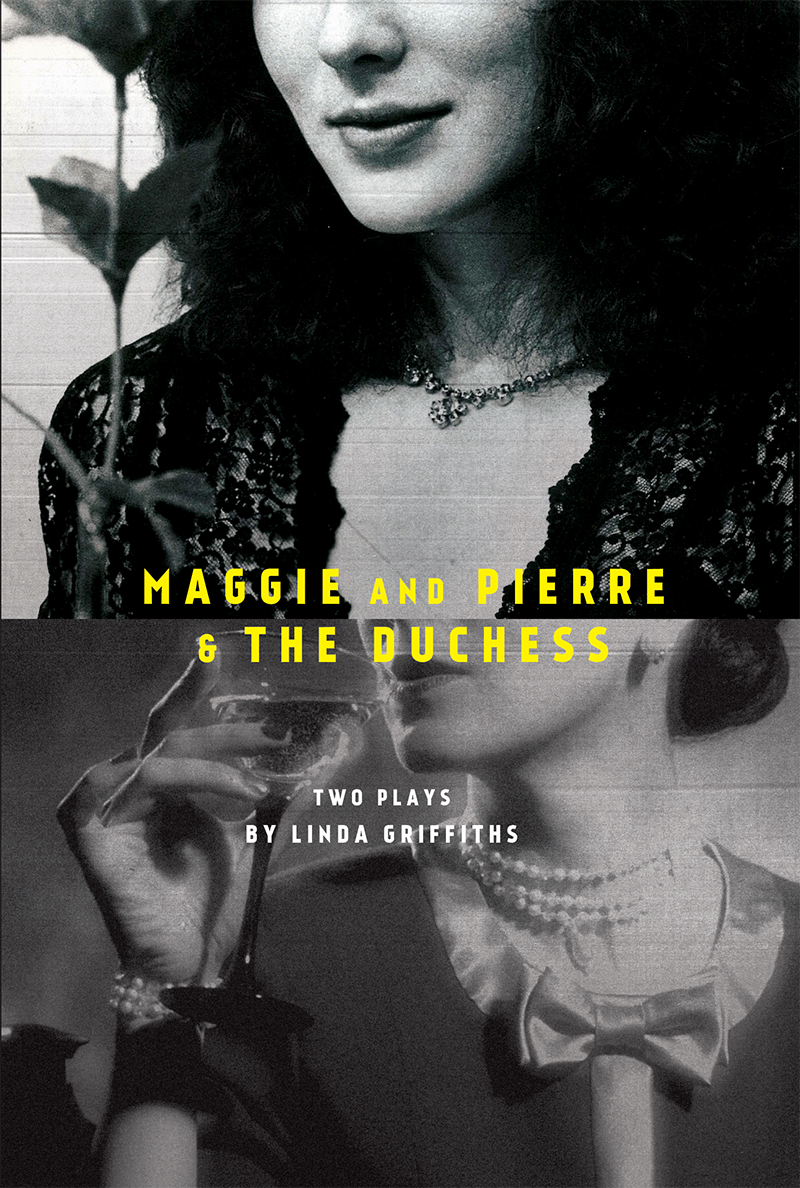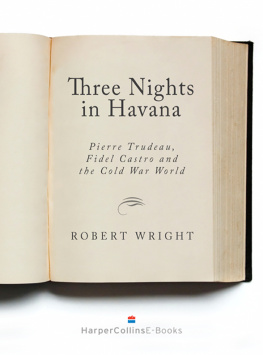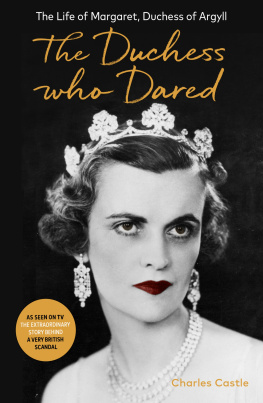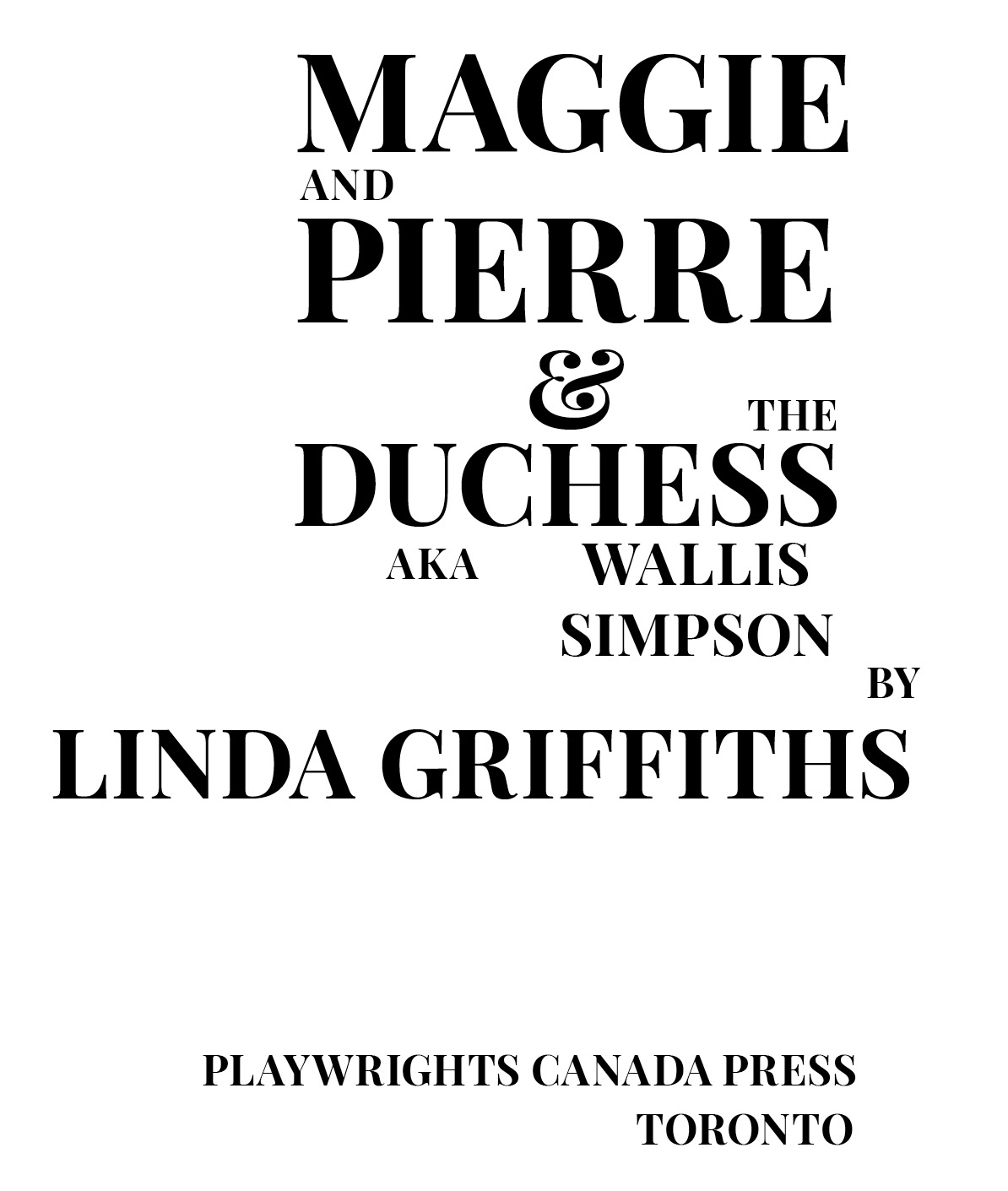 Other titles by Linda Griffiths: The Book of Jessica (with Maria Campbell) Age of A rousal Alien Creature: A Visitation from Gwendolyn M acEwen Sheer Nerve: Seven Plays (includes Maggie and Pierre, O.D. On Paradise, Jessica, The Darling Family, A Game of Inches, Brother Andres Heart, and The Du chess ) C hronic
Other titles by Linda Griffiths: The Book of Jessica (with Maria Campbell) Age of A rousal Alien Creature: A Visitation from Gwendolyn M acEwen Sheer Nerve: Seven Plays (includes Maggie and Pierre, O.D. On Paradise, Jessica, The Darling Family, A Game of Inches, Brother Andres Heart, and The Du chess ) C hronic
Maggie and Pierre; The Duchess Copyright 2013 by Linda Griffiths The forewords and introduction Copyright 2013 by their respective authors All photographs Copyright 2013 by their respective photographers Copyright Renewed. International Rights Secured. Used by Permission. All Rights Reserved
Playwrights Canada Press 202-269 Richmond Street West, Toronto, ON, Canada M5V 1X1 phone 416.703.0013 No part of this book may be reproduced, downloaded, or used in any form or by any means without the prior written permission of the publisher, except for excerpts in a review or by a licence from Access Copyright, www.accesscopyright.ca. 204A St. 204A St.
George Street, Toronto, ON M5R 2N6 416.960.9686, Cover design by Leah Renihan Book design by Blake Sproule Photo Credits: Cover: Linda Griffiths as Margaret Trudeau by Glen Erikson, Linda Griffiths as Wallis Simpson by Trudie Lee. Library and Archives Canada Cataloguing in Publication Griffiths, Linda, 1956-, author Maggie and Pierre & The duchess / Linda Griffiths. Includes two plays: Maggie and Pierre and The duchess. Electronic monograph. Issued also in print format. ISBN 978-1-77091-179-6 (pdf).-- ISBN 978-1-77091-180-2 (epub) I.
Griffiths, Linda, 1956- Duchess II. Title. III. Title: The duchess. IV. Title: Maggie and Pierre and The duchess.
PS8563.R536M34 2013 C812.54 C2013-904409-4
We acknowledge the financial support of the Canada Council for the Arts, the Ontario Arts Council (OAC)an agency of the Government of Ontario, which last year funded 1,681 individual artists and 1,125 organizations in 216 communities across Ontario for a total of $52.8 millionthe Ontario Media Development Corporation, and the Government of Canada through the Canada Book Fund for our publishing activities. Mythologizing the Wilderness: An Introduction To Linda Griffiths After a long and difficult gestation involving, collectively and individually, Maria Campbell (Metis author and activist), Linda Griffiths (actor and writer), and Paul Thompson (theatre director and founder of the iconic Theatre Passe Muraille),
The Book of Jessica: A Theatrical Transformation rises in 1989 like a phoenix from its combustion of creative egos and cultural sensitivities. Ultimately containing the play
Jessicawritten by both women, initially acted by Griffiths and directed by Thompsona searing and sensitive exploration of its artistic process, and a play about the play,
The Book of Jessica dramatizes Griffithss brave streak through the gauntlet of personal and political revelation. This journeyriveting and raw, intelligent and passionate, realistic and fantasticinforms her best work. Linda Griffiths creates drama that articulates, whether with painful effort or blinding clarity and usually with excoriating humour, the existence of a wilderness in all of us and the desire to explore it, the dangers hidden within it, the necessity of knowing it without destroying it, of harnessing its power and understanding how to use it. In a note prefacing her play
Chronic (2003), Griffiths says, Only in nature, inner and outer, is there some balance.
Only in the inner forest is there light. Yet her work is neither therapeutic nor particularly consoling. It is disturbing, unnerving. It wakes you up. And keeps you awake with what she identifies in The Book of Jessica as the theatre gods. Often referred to as her fabulist instinct and contextualized by her own production company, Duchess Productions, as a dance between the personal, the political, and the fantastic, this non-naturalistic impulse (harnessed to real story) is her particular connection to the unknown, the unseen; it is her larger spiritual home.
In The Book of Jessica, that wavering needcomplicated by Catholic guilt and Celtic historyclashes with Metis Marias own mixed-race background, deconstructing and re-constructing both women through an urgent poetry that remains unique in Canadian drama. In his introduction to Chronican ecodrama that joins the twentieth-century idea of illness as metaphor with twenty-first-century cyber technology to explore various pathologies of modern lifeJerry Wasserman declares accurately that Griffithss central figure is almost always a woman engaged in a struggle for power. As well, Almost every play features some kind of alien invasion or visitation. And Griffithss women, he goes on, either wrestle with or channel the power of that other dimension. The eponymous Jessica in the 1981 play confronts the fierce animal spirits of her people. Perpetual flower child, Margaret Trudeau (Maggie and Pierre 1979)ferocious and funnypaces the cage of modern feminism, political imperatives, and counter-culture fantasies.
Wallis Simpson in The Duchess (1998) cavorts with a chorus of aristocrats and dancing jewels. The pregnant she and her impregnating he in The Darling Family (1991) wind themselves tight as tops in their neurotic Never Never Land. The hilarious Game of Inches invokes baseball fantasies to spotlight the complications of real-life relationships. Poet Gwendolyn MacEwen meets with her dark invaders in Alien Creature (1999). Allowing the other dimension always involves risk. on Paradise (1982) watch their fragile self-images crack under the solar microscope of a Caribbean getaway. The Darling Family, ingeniously subtitled A Duet for Three, relentlessly examines the forces that come into play when their big event occurs. The Darling Family, ingeniously subtitled A Duet for Three, relentlessly examines the forces that come into play when their big event occurs.
Indeed, the piece is an experiment in minimalism and anonymity appropriate for underlying tragedy as startling in its effect as Hemingways Hills Like White Elephants or Joan Barfoots Dancing in the Dark. Petra in Chronic must confront her virus, animate and insistent; Gwendolyn MacEwen in Alien Creature must deal with the creative-destructive power of her poetry through the mask of magic. The comically deadbeat, youthfully inept filmmakers in Brother Andres Heart (1993), animated by their addiction to Star Trek: The Next Generation and characters from The Clan of the Cave Bear, flesh out their fantasy lives with a heart heist (based on an actual news story) of the holy relic from Montreals famous basilica, only to realize that genuine sainthood involves genuine work. These are all versions of Griffithss theatre gods, that other dimension that can be identified with the wilderness inside major (often female) characters, as a spiritual quest, theatrically undertaken. How do Griffithss theatre gods operate? The Book of Jessica embraces a process that is relentlessly vulnerable, refusing to censor difficult emotions. Rather than being uncomfortably confessional, it encourages us all to explore the deep wells of our fears and desires, our shame.
Next page











 Other titles by Linda Griffiths: The Book of Jessica (with Maria Campbell) Age of A rousal Alien Creature: A Visitation from Gwendolyn M acEwen Sheer Nerve: Seven Plays (includes Maggie and Pierre, O.D. On Paradise, Jessica, The Darling Family, A Game of Inches, Brother Andres Heart, and The Du chess ) C hronic
Other titles by Linda Griffiths: The Book of Jessica (with Maria Campbell) Age of A rousal Alien Creature: A Visitation from Gwendolyn M acEwen Sheer Nerve: Seven Plays (includes Maggie and Pierre, O.D. On Paradise, Jessica, The Darling Family, A Game of Inches, Brother Andres Heart, and The Du chess ) C hronic
